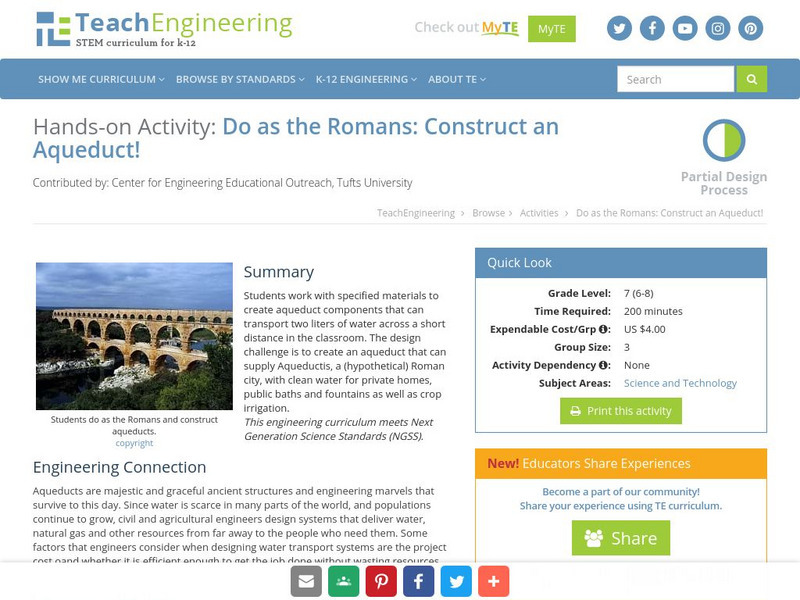Hi, what do you want to do?
media.yurisnight.net
Science Lesson Plan: Our Solar System: I Wonder?
Ever wonder why Pluto isn't considered a planet? Or how large the Earth is compared to the other inner planets? Explore the universe with a series of projects that simulate different aspects of our solar system. The activities require...
DiscoverE
Marble Run
It's time to slow your roll! Can your class create a track that allows a marble to roll as slowly as possible? Teams of science scholars collaborate to design, build, and test their tubes while learning about gravity and friction.
Curated OER
Element Project
Ninth graders review and discuss the Periodic table and its 53 elements. They choose one element to become an expert on and then create a written Report in the form of a poster about their choosen element to be presented to the class.
Curated OER
Tutankhamen's Gift
Sixth graders identify the ancient "cradles of civilization." They compare cultures from different parts of the Eastern Hemisphere. Students describe various ways leaders are elected, appointed, or acquire power. They discuss ways...
Curated OER
Star Quest
Students engage in a lesson of using maps in order to find constellations in the night sky. They also conduct research using three constellations. The research is used to create a project to inform others. The teacher also leads the...
Cornell University
Catapults
Ready, aim, fire! Launch to a new level of understanding as scholars build and test their own catapults. Learners explore lever design and how adjusting the fulcrum changes the outcome.
National Energy Education Development Project
Exploring Hydropower
In 2006, about 20 percent of the world's electricity was generated from hydroelectric power. In the presentation, scholars review the water cycle and gravitational energy to begin to understand how humans harness the power of water. They...
National Science Teachers Association
Adopt-a-Dino
Earth historians research a specific dinosaur, write a paper about the Mesozoic era that it lived in, create an artistic rendition of the environment, and give a presentation in class about what they learned. Be aware that there are...
Curated OER
Eureka! I’ve Got an Idea!
Students explore many inventions and inventors. In this science lesson plan, students collaborate as they research inventors and their times in order to compile information to build an informative Web site.
Curated OER
It's Written in the Stars!
Children create narrative accounts about their character traits, illustrate the constellation of each sign of the Zodiac, and write and illustrate their own creative myths about an original "Zodiac Sign". They use the computer as a...
Curated OER
Sundials
Students investigate the different types of sundials and their history. In this shadows and time of day lesson students build their own sundials.
Curated OER
Pyrites
Students examine the mineral pyrite and discover the differences between it and gold. In this mineral activity students identify minerals using their common properties.
Curated OER
Volcanoes
Students explore the formation of volcanoes. In this earth science lesson, students build their own volcanoes in the lab using different materials. They identify the different types of volcanoes.
Curated OER
Middle Ages Timeline
Students research a historical figure from the Middle Ages. In this Middle Ages lesson plan, students present important events of their characters life and of the time. Students write a time card for each significant...
Curated OER
Bouncing Sunlight
Third graders use flashlights and balls to demonstrate how the light bounces off of the sun and reflects onto the moon. They record their observations in a journal.
Curated OER
Mineral Munch
Second graders explore the sodium content in foods they eat. After observing a table setting, 2nd graders then identify items made from rock. They taste low sodium crackers and compare them to regular crackers. Students discuss the...
TeachEngineering
Teach Engineering: Do as the Romans: Construct an Aqueduct!
In this activity, students work with specified materials to create aqueduct components that will transport 2 liters of water across a short distance in their classroom. The goal is to build an aqueduct that will supply Aqueductis, a...





















